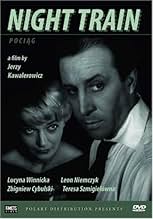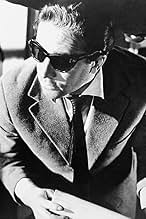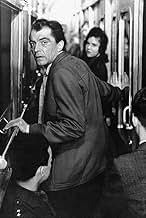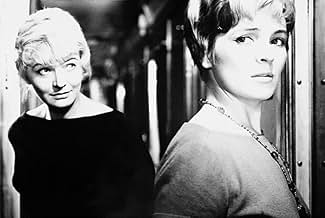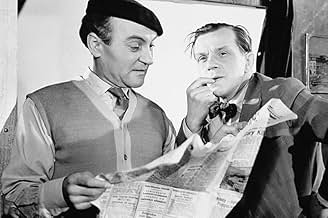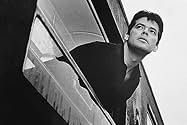NOTE IMDb
7,7/10
3,9 k
MA NOTE
Ajouter une intrigue dans votre langueJerzy enters a train set for the Baltic coast. He seems to be on the run from something, as does the strange woman with whom he must share a sleeping compartment.Jerzy enters a train set for the Baltic coast. He seems to be on the run from something, as does the strange woman with whom he must share a sleeping compartment.Jerzy enters a train set for the Baltic coast. He seems to be on the run from something, as does the strange woman with whom he must share a sleeping compartment.
- Réalisation
- Scénario
- Casting principal
- Récompenses
- 2 victoires et 1 nomination au total
Andrzej Herder
- Sailor
- (non crédité)
Barbara Horawianka
- Jerzy's Wife
- (non crédité)
Avis à la une
Sadly, I can't agree with most people who find this film to be Hitchcockesque in its representation of a thriller.
To say this would be to say that your Jaguar is just like a Mercedes. They might both be fine cars, but they are in no way alike.
The really quite simplistic plot travels at a slow and in many ways, inexplicable pace. There is little tension built up, and, for the most part, little mystery to be found.
However, don't take any of this to be a retrograde description.
The various small character subplots and interactions are wonderful. The whole journey has a quite haunting feel to it, which I find I am at loss to explain, because if I analyse the film, there is no real reason to this feeling. And yet, there it is.
The beautiful and mysterious Lucyna Winnicka is utterly mesmerising.
In so many ways this film shouldn't work with anything like the power it achieves, but somehow it does. If it captures you in the way it has me, then it will stay with you long after the event, from the strange individual passengers right down to the oh so ethereal soundtrack.
I am without explanation, but I truly hope it gives you the feeling of something wonderful it gave me.
To say this would be to say that your Jaguar is just like a Mercedes. They might both be fine cars, but they are in no way alike.
The really quite simplistic plot travels at a slow and in many ways, inexplicable pace. There is little tension built up, and, for the most part, little mystery to be found.
However, don't take any of this to be a retrograde description.
The various small character subplots and interactions are wonderful. The whole journey has a quite haunting feel to it, which I find I am at loss to explain, because if I analyse the film, there is no real reason to this feeling. And yet, there it is.
The beautiful and mysterious Lucyna Winnicka is utterly mesmerising.
In so many ways this film shouldn't work with anything like the power it achieves, but somehow it does. If it captures you in the way it has me, then it will stay with you long after the event, from the strange individual passengers right down to the oh so ethereal soundtrack.
I am without explanation, but I truly hope it gives you the feeling of something wonderful it gave me.
10gombro
The film beautifully depicts the reality of trains, possibly not only those running in Poland but also all over the world. The claustrophobic atmosphere of the train brings people together and lets the viewers plunge into the story and its rhythm. Beautiful black and white pictures and melancholic jazz theme bring to mind other films form the era. What makes the film even more attractive is the final turning point and sudden change in the behavior of the passengers. The only regretful fact is that such intimate,subtle films are not made anymore. Great pity.If it was made in English by lets say Orson Welles it would have been a cult movie for sure all over the world just as it is in Poland.
10adipocea
This is a film which is a privilege to watch, I don't understand why Criterion collection doesn't have this issued yet. If you didn't watch it make yourself one of the biggest favors and watch it right away. I won't describe the movie, I won't spoil your pleasure. This is not a great movie in the sense that other great movies from the same period are considered masterpieces by critics but when we come to watch them they impress us very little. This is a treat, a delight, a thrill, by any modern standards, you have just to find some good subtitles not the lousy ones available on the web and translated online word by word by translation websites. I myself have watched the movie with this kind of subtitles and still I managed to be impressed to tears by this gem. A big bravo to Jerzy Kawalerowicz!
Although it has superficial similarities with Hitchcock films (it's in black and white; it takes place on a train; it's a murder mystery; there are plenty of red herrings and misleading clues), I loved this moody Polish film because it is visually stunning and refreshingly free of Hollywood clichés. I saw a lot of Expressionist influence in the artfully planned staging and unusual camera angles, both inside the cramped railway corridors and outside the train in various stops along the route. The film is fairly demanding on the viewer: there are a lot of secondary characters with complicated stories of their own, and I found myself repeatedly pausing the DVD to catch details that I had missed. The final scenes were intricately choreographed and highly stylized, reminiscent of black-and-white-era Fellini. Not for everyone, but I found it delightful and plan to watch it again.
This is definitely one of the greatest, and at the same time, one of the most under-appreciated movies in the history of Polish cinema. Jerzy Kawalerowicz is a true master craftsman in the country's film world, and with Night Train he once again proved that this statement is perfectly true. It's a shame that the movie is sometimes cruelly omitted when talking about fine post-war cinema, because it is certainly worth a watch.
Night Train is different from other various Polish movies that came out in the 50's and later, as it doesn't present the social problems that the country had to fight with during the difficult period of Communism.
It reminds me of the movies directed by the Master of Suspense, Sir Alfred Hitchcock, as it contains the recurring themes of murder, suspenseful mystery, the wrongly accused man and a search for the real criminal.
It also reminds me of the great noir movies produced in the United States or Italy throughout the 20th century. It possesses a deeply sombre tone and claustrophobic ambiance created by the particular scenery, in which it takes place - a train. All of this is complemented with an eerie music playing in the background.
Aboard the train, which goes from Lodz to the seaside in Poland, there are many unusual, strangely mysterious, and overly suspicious passengers. One of them is Jerzy, the main character, played brilliantly by Leon Niemczyk. Strolling around in his classy dark glasses he seems like he needs to hide from something or someone. Unfortunately, due to some peculiar circumstances, he has to share the sleeping cabin with a pretty lady, Marta. However, as time passes by, the two are starting to have a connection, because of the seemingly similar life experiences and peculiar interests.
In the neighboring compartment we can find an unnamed man with his nosy wife, who quickly starts to flirt with distracted Jerzy. She looks so unhappily married that she resolves to flirting with almost all of the co-travelers.
Then there is also Staszek, the boy, who is deeply in love with Marta, but, due to some unmentioned previous occurrences, she doesn't want to be with him any more.
All those characters' affairs intertwine at various points in the storyline. Great and clever dialogues accompany every scene. And in the middle of it all there is the tranquil search for the murderer. However, as important as it may seem sometimes, it isn't actually the main topic of Night Train.
The hunt for the killer occurs in the climax of the movie, when an angry mob runs through the train cars and into the woods to finally catch him. What happens next – the public execution (however not deadly) reminded me of the great western The Ox-Bow Incident. The will of the majority always wins, no matter if someone is legally found guilty or not.
The final scene beautifully reflects what had happened on that night - the compartments are empty, and look somehow pure, but the scattered belongings and open windows give the sequence an obscure touch.
All in all, Night Train is truly a fantastic Polish movie with many suspenseful twists, romance and a huge emphasis put on various characters' personalities, in order to show that anonymity is omnipresent and everyone can almost hide in its shadow if he wants to.
Night Train is different from other various Polish movies that came out in the 50's and later, as it doesn't present the social problems that the country had to fight with during the difficult period of Communism.
It reminds me of the movies directed by the Master of Suspense, Sir Alfred Hitchcock, as it contains the recurring themes of murder, suspenseful mystery, the wrongly accused man and a search for the real criminal.
It also reminds me of the great noir movies produced in the United States or Italy throughout the 20th century. It possesses a deeply sombre tone and claustrophobic ambiance created by the particular scenery, in which it takes place - a train. All of this is complemented with an eerie music playing in the background.
Aboard the train, which goes from Lodz to the seaside in Poland, there are many unusual, strangely mysterious, and overly suspicious passengers. One of them is Jerzy, the main character, played brilliantly by Leon Niemczyk. Strolling around in his classy dark glasses he seems like he needs to hide from something or someone. Unfortunately, due to some peculiar circumstances, he has to share the sleeping cabin with a pretty lady, Marta. However, as time passes by, the two are starting to have a connection, because of the seemingly similar life experiences and peculiar interests.
In the neighboring compartment we can find an unnamed man with his nosy wife, who quickly starts to flirt with distracted Jerzy. She looks so unhappily married that she resolves to flirting with almost all of the co-travelers.
Then there is also Staszek, the boy, who is deeply in love with Marta, but, due to some unmentioned previous occurrences, she doesn't want to be with him any more.
All those characters' affairs intertwine at various points in the storyline. Great and clever dialogues accompany every scene. And in the middle of it all there is the tranquil search for the murderer. However, as important as it may seem sometimes, it isn't actually the main topic of Night Train.
The hunt for the killer occurs in the climax of the movie, when an angry mob runs through the train cars and into the woods to finally catch him. What happens next – the public execution (however not deadly) reminded me of the great western The Ox-Bow Incident. The will of the majority always wins, no matter if someone is legally found guilty or not.
The final scene beautifully reflects what had happened on that night - the compartments are empty, and look somehow pure, but the scattered belongings and open windows give the sequence an obscure touch.
All in all, Night Train is truly a fantastic Polish movie with many suspenseful twists, romance and a huge emphasis put on various characters' personalities, in order to show that anonymity is omnipresent and everyone can almost hide in its shadow if he wants to.
Le saviez-vous
- AnecdotesStaszek, the young man following Marta, is seen several times getting on the train after it has started moving. The inspector warns him a couple of times that it is dangerous. Zbigniew Cybulski who plays Staszek died a few years later, aged 39, after falling under a moving train he was attempting to board at Wroclaw Glowny railway station in Poland.
- ConnexionsFeatured in Fejezetek a film történetéböl: A lengyel film (1990)
Meilleurs choix
Connectez-vous pour évaluer et suivre la liste de favoris afin de recevoir des recommandations personnalisées
- How long is Night Train?Alimenté par Alexa
Détails
- Durée
- 1h 39min(99 min)
- Couleur
- Mixage
- Rapport de forme
- 1.37 : 1
Contribuer à cette page
Suggérer une modification ou ajouter du contenu manquant

